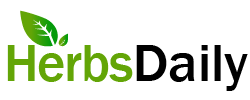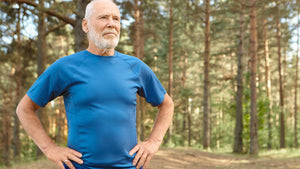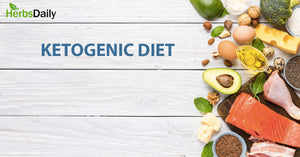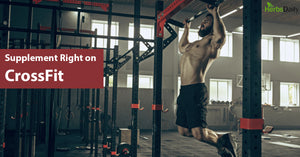Blogs

Vitamin Power: The Best Vitamin Supplements for Aging Support
Supplements aren’t just for the young, deficient, or health-conscious. Aging is a deteriorating process of physiological functions necessary for healthy living. It results from a buildup of free radicals in the body. The best way to combat this? Besides the obvious lifestyle changes like diet, exercise and sleep, supplementation plays a crucial role in aging gracefully. Though old age is inevitable, one can increase their lifespan and prevent complications with the help of supplements and other healthy lifestyle habits.
There are a lot of foods that give you aging support with almost zero side effects. Let’s take a look at a few supplements that can help increase the lifespan or slow down the process of aging:
1. Vitamin D
We often refer to vitamin D as a “free vitamin”, as we can get it for free in direct sunlight. The young and physically active can get their daily dose simply by killing some time outdoors. However, the elderly may find it difficult to go outdoors often due to reduced mobility or other physical ailments. The process of synthesis of vitamin D from sunlight also decreases with the increase in age.
Bone loss is accelerated with age, leading to increased fractures of the hips, legs, wrist, and others. Vitamin D is an essential vitamin for strong bones, as it aids in the absorption of calcium, the main component of human bones. Vitamin D also helps fight disease-causing infections in old age like cancers, chronic pain, cardiac diseases, and many other fatal conditions.
Women are more prone to bone loss as compared to men. A recommended dose of 600 to 800 international units (IU) is essential to maintain the required levels of vitamin D in your body.
2. Calcium
Calcium is the main compound involved in healthy bone development. Vitamin D helps in calcium's absorption from food taken in the gut. Hence, it is important to maintain both calcium and vitamin D at proper levels in the body for healthy bones.
Just like vitamin D, women need higher amounts of calcium as compared to men. The RDA (Recommended Daily Allowance) is 1000 mg of calcium for men and 1200mg for women.
3. Vitamin B12
Vitamin B12 is one of the most essential vitamin supplements for the elderly. The efficacy of vitamin B12 absorption is decreased with an increase in age. So, it is important to check your levels of vitamin B12 frequently and follow the directed steps by your primary care physician for healthy aging.
People with a vitamin B12 deficiency are at risk of dementia in old age. Vegans are at a much higher risk of being diagnosed with vitamin B12 deficiency, as this nutrient is found in very few plant-based sources.
The recommended dose of vitamin B12 is 2.4 micrograms a day, so be sure to look out for natural sources, else supplement.
4. Vitamin C
You must hear the phrase “antioxidant” pretty often. Well, it isn’t on purpose. Oxidative stress is a process by which free radicals produced in the body by metabolic processes end up causing inflammation and thus gradual damage to the organs, thus accelerating aging. Seems like an inescapable process, doesn;t it? The only way to combat oxidative stress is through antioxidants. Vitamin C is one of the most powerful antioxidants, and can do wonders for reversing free radical damage by balancing levels in the body. Vitamin C also boosts immunity and improves wound-healing.
The process of aging may be very exhausting, but with the help of the above vitamin supplements, you can support yourself and gracefully age. It is always recommended to consult your primary care physician before trying on a new vitamin supplement.
Herbsdaily offers a wide range of vitamin supplements to support aging.
References:
https://www.ncbi.nlm.nih.gov/pubmedhealth/PMHT0022013/
https://ods.od.nih.gov/factsheets/VitaminB12-HealthProfessional/
https://www.ncbi.nlm.nih.gov/pmc/articles/PMC5130103/

The Signs of Aging in Health: It’s More Than Just Gray Hair
Aging is a natural biological process where one might experience wrinkles on the skin, gray hair, altered body functions, and others. One can notice a change in almost every part of your body with an increase in age. While you cannot stop the aging process, you can always take some measures to make yourself look and feel your very best in old age. Let us see some major changes you may experience, and the measures or support required to to make you comfortable:
- Cardiovascular System and Bones
Your blood vessels become hard as you age, and the pressure rises. So, the heart has to work overtime, which may increase the risk of cardiovascular diseases such as heart attack, stroke, hypertension, and others. Try using the best anti-aging products, drugs, or supplements under the supervision of your doctor.
As you age, your bone density and size are also greatly reduced.
To keep your heart and blood vessels healthy, you can follow these helpful tips:
- Eat healthily: Incorporate fresh vegetables, fruits, whole grains, and lean protein from fish. Eat sufficient foods that are rich in calcium and vitamin D for healthy bones.
- Avoid smoking: There is plenty of scientific evidence to prove that smoking increases the risk of cardiovascular disease, especially for the elderly.
- Physical exercise: Move your body frequently. Exercise for at least 20 minutes a day to encourage a healthy cardiovascular system and bones.
- Limit stress: Get enough rest and manage your mental health. You can control stress levels through yoga, meditation, or therapy.
2. Skin
One of the most obvious signs of aging, your skin becomes dry with increased wrinkles, making it less supple than it used to be. A significant amount of fat content in the skin is lost, resulting in facial sagging. You will experience dryness due to a decrease in production of natural oils in the skin.
But fear not, the following tips can help you in maintaining healthy, youthful skin.
- Be gentle: Use warm water to clean your skin rather than hot water, as it makes your skin dry.
- Use the right skincare products: Direct exposure to sunlight can accelerate aging in the skin, so be sure to wear sunscreen before leaving the house. Collagen-boosting supplements and creams can also help increase elasticity. Use anti-aging skincare supplements for skin. You can also go for anti-aging vitamins for wrinkles on the face.
3. Eyes, Teeth, and Ears
As you age, you may experience vision problems, hearing loss, and dental problems.
To help with these, be sure to do the following:
- Regular checkups: Consult your doctor to maintain healthy eyes, teeth, and ears. You may need optical apparel, sunglasses, hearing aids, and dental aids.
- Take sufficient precautions: Clean your teeth regularly. Use sunglasses when you are outdoors. Use earplugs when you go to noisy areas.
4. Digestive and Urinary System
Structural alterations in the large intestine in elderly people may lead to constipation. The decreased physical movement, low fiber intake, and low fluid intake may also contribute to digestive issues in old age. The bladder may become less elastic and one may experience urinary inconsistency. Having diseases such as hypertension, diabetes, and using medications may also lead to inconsistency. Anti-aging capsules and supplements for longevity can be used under the doctor’s supervision. But besides the obvious medication option, the following steps can help you support your digestive and urinary system:
- Go to the toilet when needed: Do not ignore urinary and bowel movements! Putting off going to the bathroom can cause even more pain due to a build-up of toxins, so go to the toilet whenever you need to.
- Maintain a healthy diet: Fiber is your new best friend. Consume loads of fiber-rich foods like whole grains, fruits and vegetables in order to have healthy and timely bowel movements.
- Quit smoking and limit your alcohol intake: This one’s fairly self-explanatory, but very important to remember.
- Move your body: Physical exercise helps in the healthy passage of stool.
5. Mental Health
You may notice that you seem to forget relatively simple or obvious things, and there’s good reason for it. Memory, cognitive abilities, and one’s problem-solving capacity are reduced with an increase in age. Consult your doctor if your symptoms start causing harm to you or your loved ones. The following can help you in supporting your mental health:
- Exercise, eat and drink: What we eat, drink, and do plays a major role in our lives. Choose a healthy lifestyle for wonderful aging.
- Be social: Engaging in social activity can give you a new setting to express yourself, while also refreshing your thoughts. One can find a surprising sense of healing in a community.
- Avoid smoking and treat chronic illnesses: Chronic illnesses are associated with mental illness.
There are many aids to help the elderly for blissful aging. Be sure to maintain a healthy emotional state with your family and loved ones. All the above aging support can help you lead a happy and comfortable life with minimal support.
Herbsdaily offers a wide range of products for aging support to help you lead a memorable old age.
References:
https://www.nia.nih.gov/health/heart-health-and-aging
https://www.bones.nih.gov/health-info/bone/osteoporosis/overview
https://www.nia.nih.gov/health/urinary-incontinence-older-adults
https://www.nia.nih.gov/health/cognitive-health-and-older-adults
https://www.nia.nih.gov/health/aging-and-your-eyes
https://www.nia.nih.gov/health/hearing-loss-common-problem-older-adults
https://www.nia.nih.gov/health/skin-care-and-aging
http://www.ninds.nih.gov/disorders/brain_basics/understanding_sleep.htm.

Do Keto Right: How to Supplement on a Ketogenic Diet
Every millennial is talking about it. You probably have about a dozen friends on the diet right now. But what does it really mean to be on keto? To put it simply, a ketogenic diet is a high fat, moderate-protein, and low-carb diet similar to the Atkins diet, which can provide miraculous results in weight loss. However, it does require cutting out very important food groups for a certain period of time. Foods to avoid on keto include grains, low-fat dairy products, beans, added sugars, and starchy vegetables. This makes it all the more crucial to eat right and stay well supplemented throughout your diet program. Here are some great keto supplements to use for better results:
1. Digestive Enzymes: A ketogenic diet may require the consumption of a diet of 75% fat, which is pretty rough on the digestive system, especially if you’re new to keto. Those more accustomed to low-fat diets may experience adverse effects like bloating, diarrhoea, and nausea. Digestive supplements will contain enzymes like lipases and proteases which break down fat and protein respectively. This can aid in a peaceful transition into the keto diet.
2. Magnesium: Due to our society’s overdependence on fast food and processed food, every day it gets a little harder to meet your magnesium needs. Magnesium is essential in blood sugar control, immune support, and boosting energy. Keto can do a number on your magnesium levels since carbs like beans and fruit are mostly cut out of your diet plan. Taking a magnesium supplement every day can help improve energy levels during workouts, prevent muscle cramps, and improve sleep.
3. MCT-Oil: Medium-Chain Triglycerides are different from long-chain triglycerides present in fats used to cook most foods. MCTs are broken down in the liver and metabolized quickly into the bloodstream to be used by the brain and muscles for energy. Though it is naturally found in coconut and palm oil, MCT is often taken as a supplement by keto practitioners for a more concentrated dose. MCT oil rapidly increases fat intake, which allows for constant ketosis, thus promoting weight loss.
4. Omega-3 Fatty Acid: EFAs or Essential Fatty Acids (Omega-3 and Omega-6) are necessary for the body’s normal function. Though most western diets are rich in Omega-6 fatty acids, they are low in Omega-3 fatty acids. Such an imbalance can cause inflammation and slow down crucial muscle recovery, especially when you start keto. Hence, it is important to supplement with good fish oil capsules containing a combined serving of at least 500g per 1000g of DHA and EPA, the health-giving components of Omega-3 fatty acids.
5. Vitamin D: Vitamin D is important for the proper synthesis of calcium in the body, a nutrient often absent in a keto diet plan. It also helps in preventing inflammation, promoting bone health, supporting the immune system, and regulating cellular growth, all vital functions for those working out on a ketogenic diet. Since there are very few foods naturally rich in vitamin D, a deficiency in this salient nutrient is common, making supplementation key.

Competitive Edge: How to Supplement Right on CrossFit
If you’re a dedicated CrossFit practitioner, then you probably already know how important it is to keep your body performing at the top of its game. CrossFit is more of a lifestyle than just a demanding workout. So that makes it all the more necessary to supplement and supplement right while implementing your exercise plan. Not to mention, feeding your body the right tonic might just give you the perfect competitive edge. This means a supplementing regimen that is entirely different from the usual whey protein route most bodybuilders take. CrossFit not only tests strength but also endurance, agility, speed, and power. Here are some crucial supplements for athletes and how to take them while on a CrossFit training program:
1. Creatine Monohydrate: Creatine is an all-natural supplement used to enhance athletic performance. It is a popular choice among professional athletes and gym enthusiasts. Creatine helps create extra reserves of phosphocreatine in the body, which are used to form adenosine triphosphate (ATP), the key ingredient for energy creation and cell function. During high-intensity exercise, the body needs more ATP than it burns for energy, which is why creatine monohydrate powder is so important particularly for CrossFit. Besides this, it also aids in the building of muscle mass and even helps to fight a number of neurological diseases.
2. Beta-Alanine: Another top pick of fitness freaks, beta-alanine is a non-essential amino acid, meaning it is not used by the body to synthesize proteins. Instead, it helps the body create carnosine, a substance stored in the skeletal muscles to help reduce lactic acid build-up during exercise and thus improve athletic performance. It aids in muscle endurance and reduces recovery time from muscle soreness, a common condition among CrossFitters.
3. Fish Oil: Nobody hates soreness and muscle aches more than gym-goers, which is why when it comes to attending your regular workouts, getting back on your feet as soon as possible is an absolute necessity. Luckily, fish oil is a great source of Omega-3 Fatty Acids, an Essential Fatty Acid that can help prevent DOMS (Delayed Onset Muscle Soreness), and effectively curtail muscle damage especially during resistance training. It is among the most preferred natural muscle recovery supplements.
4. BCAAs: Besides being incredibly tasty for a supplement, Branched-Chain Amino Acids are very helpful in muscle recovery and CrossFit health. Of the three main types of BCAAs, leucine is perhaps the hardest working. By encouraging protein synthesis and preventing protein breakdown, BCAAs help to keep your muscles functioning like a well-oiled machine.
5. Protein Powder: Good old protein powder has been tried and trusted by athletes all over the world for decades. Whey is a by-product of milk, and a 100% natural source of protein. Vegetarians and athletes with multiple workouts planned for the day consider whey protein supplements a god-send for muscle recovery.










































